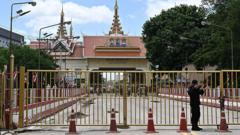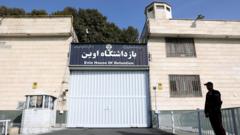American lecturer Paul Chambers is under investigation for allegedly violating Thailand's strict lese-majeste law, intensifying debates over free speech and monarchy reform.
**Thai Court Issues Arrest Warrant for American Scholar Under Lese-Majeste Law**

**Thai Court Issues Arrest Warrant for American Scholar Under Lese-Majeste Law**
A US academic faces arrest in Thailand amid increased scrutiny of royal criticism as activists push for reform.
A Thai court has issued an arrest warrant for Paul Chambers, an American academic, under the country's lese-majeste law, which criminalizes insults against the monarchy. The army has lodged a complaint against Chambers, a lecturer at Naresuan University, citing violations of both lese-majeste and computer crime regulations. Legal representatives noted that Chambers and his attorney are scheduled to meet with police on Tuesday, where official charges are anticipated. Akarachai Chaimaneekarakate, Chambers' advocate from the Thai Lawyers for Human Rights Centre, expressed uncertainty about the details of the complaint's basis.
If convicted, Chambers could face a prison sentence of three to 15 years for each count under the lese-majeste law. The Royal Thai Police have been contacted for further remarks regarding the case. Though it is infrequent for this law to be applied to foreigners, there have been precedents, as Akarachai mentioned. The army's allegations against Chambers include "defamation, contempt or malice" towards the royal family and the transmission of harmful computer data.
The warrant was issued on Monday, with the potential for Chambers to either be released on bail or detained, pending police investigations. Chambers has been a resident and educator in Thailand for over 30 years, focusing on military studies and other topics pertinent to the nation. His legal team indicated that he has yet to receive any formal subpoena.
Thailand's lese-majeste law has existed since the establishment of its first criminal code in 1908, gaining stricter penalties in 1976. The Thai government defends the law as a safeguard for the monarchy, while critics argue that it stifles free expression. Akarachai remarked that the law has become more prominent since the emergence of pro-democracy protests targeting the monarchy in 2020.
Recent months have seen a resurgence of the law, with over 300 cases reported since late 2020, encompassing over 270 individuals, including minors. The legal actions taken against dissenters, including academics, have raised concerns about political persecution. Last year, a pro-reform political party was disbanded for advocating changes to the lese-majeste law, declared unconstitutional by the courts.
In response to these developments, the European Parliament urged Thailand to amend its stringent laws and considered granting amnesty to those affected. The Thai parliament is expected to deliberate on amnesty proposals in the coming days, as human rights advocates continue to push for reforms.





















